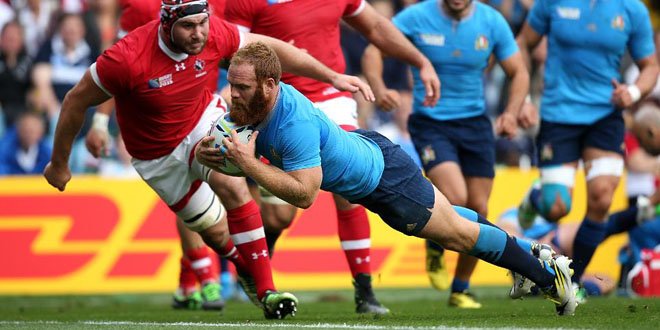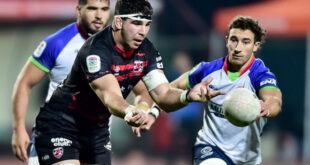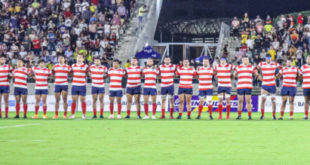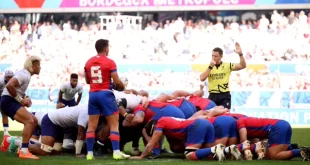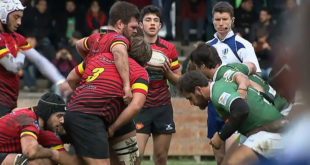Italy and World Rugby face an escalating player eligibility scandal. Hot on the heels of Spain’s disqualification from Rugby World Cup 2023, serious questions have arisen concerning the eligibility of Italian players that played in past Rugby World Cups.
Italy has capped many players from Argentina. Among them are Italy’s two most capped players – Sergio Parisse (142 caps) and Martín Castrogiovanni (119 caps). Both were regarded as big losses by Argentina.
All players qualify to represent a country via Regulation 8 Eligibility. Players can achieve eligibility via (a) country of birth; or (b) country where one parent or grandparent was born; or (c) complete five years of consecutive residency immediately before representative duty; or (d) complete ten years of cumulative residence preceding the time of playing. Until recently, the residency requirement was three years.
Parisse qualified via his parents and Castrogiovanni via a grandparent. However, Castrogiovanni’s connections to Italy are through his father’s grantparents. In other words, Castrogiovanni was not eligible to play for Italy. He played in Rugby World Cups 2003, 2007, 2011 and 2015. He also played in RWC qualifiers in 2002 and 2006.
Luciano Orquera played alongside Parisse and Castrogiovanni. The Argentine fly half earned Italian 48 caps, including three at Rugby World Cup 2011. Orquera qualified for Italy via a grandparent; however, his family connections to Italy are through a great-grandparent not a grandparent.
Extremely serious doubt also surrounds Carlo del Fava. The South African played for Italy from 2004-2011. He played World Cup matches against Portugal and Scotland in 2007 and against Australia in 2011. He also played in Italy’s RWC 2007 qualifier against Portugal. Despite, reports that his father was from Italy, the player says that his Italian family is through his great-grandfather.
The three instances require an investigation by World Rugby. All three players are on record saying their connection to Italy is via a means of ancestry that is not permitted by Regulation 8. Serious eligibility questions also need to be asked of other Italian World Cup players.
It appears that Italy and World Rugby may have repeated the same error many times. Four additional World Cup players are on record as having their ties to Italy via a great-grandparent rather than a grandparent or parent.
Gonzalo García played for Italy at Rugby World Cups 2011 and 2015. He earned 44 caps for Italy from 2008-2016. He played u19 and u21 for Argentina and began his professional career in Italy in 2007. García debuted for Italy in June 2008, doing so via ancestry.
During RWC 2011 La Gazzetta cello Sport noted that García’s maternal great-grandfather was from Italy. This matches what Benetton reported in an interview with the player in 2009; namely, his Italian ties are to Parma through a great-grandparent.
Santiago Dellapè retired from international rugby months before RWC 2011. He had moved from Argentina to Italy in December 2000 and debuted for Italy in February 2002. He played for Italy at Rugby World Cups 2003 and 2007 and in qualifying matches against Spain in 2002 and Portugal in 2006.
La Repubblica reported in 2003 that Dellapè was able to play for Italy because of his great-grandfather from Cosenza. This is consistent with an interview. In the month of his debut for Italy, Dellapè said that he has great-grandparents from Cosenza.
It should be noted that García and Dellapè would not have met World Rugby residency requirements when they debuted for Italy. Nor would have Ramiro Pez. The first of his 40 caps was against Samoa in 2000. He left his native Córdoba to play for Rugby Roma in 2000.
Pez played in RWC 2007 qualifiers against Portugal and Russia in 2006 and two matches at Rugby World Cup 2007. His eligibility was via ancestry; however he could not qualify via a parent or grandparent. His great-grandparents were from Rome and Udine. This qualified him for an Italian passport but not to play rugby for Italy.
Gonzalo Canale lived in both Argentina and Italy as a child. He moved to Italy for a second time before debuting for Italy at the age of 19. He played 86 test matches for Italy, including eleven matches at World Cups. He played in RWCs 2003, 2007 and 2011.
At the time of debuting for Italy he would not have been eligible via residency. Despite having spent more than three years of his youth in the country, the timing had not immediately preceded his debut.
Canale qualified via ancestry not residency. However, like Castrogiovanni, Dellapè, del Fava, García, Orquera, and Pez, Canale’s parents and grandparents were not from Italy. He qualifies for and has held an Italian passport since a young age. The former center’s connection to Italy was his great-grandparents who were from Piedmont.
Italy played host to Argentina in November 2005. The 30-man roster included eight Argentines. All eight were Italian citizens; however, being a naturalized citizen does not count. Players do not require national documents to be eligible to play in World Cups let alone test rugby at all.
A scandal in March 2000 confirmed that Wales’ Shane Howarth and Brett Sinkinson and Scotland’s Dave Hilton played in Rugby World Cup 1999 despite not having been eligible. They were mistakenly allowed to play via a grandparent. Wales fielded Howarth and Sinkinson played against Argentina, Australia, Japan, and Samoa while Hilton played against South Africa, Spain and Uruguay in 1999. He also played at RWC 1995.
The International Rugby Board (IRB – now World Rugby) terminated Howarth’s Wales career. Sinkinson and Hilton returned via three-years residency to play again in 2002. Neither Wales nor Scotland were disqualified from RWC 2003 nor were they required to play in qualifiers.
The RWC 2003 qualifiers involved further eligibility breaches. The result was that the IRB disqualified Russia. This suggests that Italy should have been disqualified from RWC 2007 with Portugal qualifying instead and Russia facing Uruguay in repechage.
Other inconsistencies with Wales and Scotland from RWC 1999 occurred. Romania was replaced by Russia at RWC 2019 after Sione Faka’osilea was confirmed as attached to Tonga. Spain was disqualified because Mathieu Bélie and Bastien Fuster were captured by France via u20’s.
Countries can no longer nominate their u20 side as their ‘next senior XV’ and Bélie returned to help Spain qualify for RWC 2023. Spain had their qualifying points removed by World Rugby after Gavin van den Berg was deemed not eligible. The South African played as a replacement in Spain’s 43-0 and 52-7 wins against the Netherlands.
World Rugby replaced Spain with Romania at RWC 2023 in June, 2022. Preventing one team from playing in a World Cup only for it to alarmingly emerge that another had ineligible players in four World Cups and in qualifying matches. World Rugby’s integrity is in crisis.
Also of note is that many of the Italian players are naturalized citizens. World Rugby needs to take action and live up to its name; all players should be legal members of the country they represent. They should have official documents and have no prior representative honors at adult level for another country.
 Americas Rugby News Rugby news from across the Americas!
Americas Rugby News Rugby news from across the Americas!
